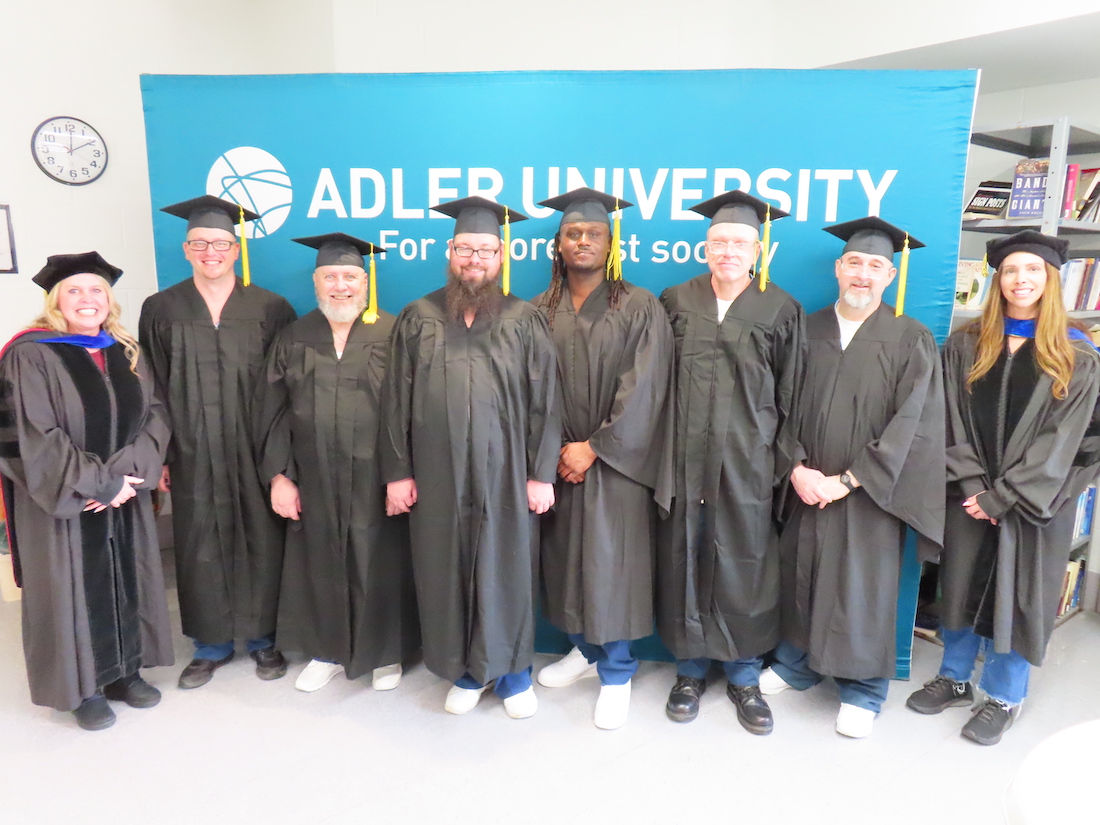By Kimber Solana
Inside his 50-square-foot cell at Big Muddy River Correctional Center, Barney Donahue found solace and purpose in his studies. Surrounded by textbooks and printed articles, he’d sit at a small table, TV muted, writing essays and completing assignments on psychology.
Every Tuesday, he would join fellow inmates in a classroom, equipped with a camera and projector, to attend lectures by Adler University professor Donna DiMatteo-Gibson, Ph.D., program director of the online Doctor of Philosophy in Industrial and Organizational Psychology program.
Then on Thursdays, he and his classmates — all students in Adler’s Bachelor of Arts in Applied Psychology completion program — entered their coursework into a computer for grading, making progress week by week.
Donahue’s persistence continued even after his release on parole in 2023, completing the program over the following two years. Being a parolee presented its own unique challenges as he faced restrictions prohibiting internet access — but he improvised. Donahue would call his sister, who would place her phone by the computer’s speaker, and he would listen to the lectures through his flip phone. He’d also dictate assignments for her to transcribe, overcoming countless obstacles to complete his degree.
“Sometimes there was a lag, and we had to make sure we weren’t talking over each other,” Donahue said. “But it worked out well enough.”
It certainly did.
On April 24, Donahue’s name was among the graduates announced during a commencement ceremony held at Big Muddy, celebrating the graduates who completed the undergraduate program — an achievement he hopes will open opportunities for him and others.
Creating pathways to education
Adler University’s online undergraduate program at Big Muddy had humble beginnings, launching initially as an eight-week online course in applied psychology in June 2021. Through a partnership with the Illinois Department of Corrections (IDOC), it was a significant step toward expanding access to education within the correctional system, offering advanced courses to inmates who had completed an associate degree or accumulated at least 60 college credits.
“This program stands as proof of what can be accomplished through dedication, collaboration, and innovation,” said Bryan Cross, IDOC educational facility administrator at Big Muddy River Correctional Center. “Through Webex sessions and Adler University’s online portal, the program was delivered in a way that honored both academic rigor and the realities of a correctional setting. These graduates worked tirelessly over nearly four years, demonstrating persistence and commitment to their education. Adler University did an outstanding job providing a meaningful opportunity for growth and learning, and we are proud to celebrate the success of these students.”
Before the program’s launch, individuals at Big Muddy had no access to pursuing bachelor’s degrees — an educational gap compounded by the facility’s remote location in Ina, Illinois, over 300 miles south of Chicago. The Adler program changed that, virtually providing incarcerated individuals with higher-level education and the opportunity to pursue meaningful careers.
“This program allowed incarcerated individuals the opportunity to complete their education and provide additional employment opportunities when they are released into the community,” said Tricia Mazurowski, Ph.D., program director of the Master of Arts in Psychology and Bachelor of Arts in Applied Psychology online programs.
Career opportunities for graduates with a bachelor’s degree in applied psychology include community outreach worker, homeless program outreach counselor, behavioral health specialist, psychiatric technician, addictions counselor, social services management, mental health crisis worker, public health educator, among others.
The 20-course program was delivered entirely online, with weekly synchronous sessions promoting engagement and collaboration. Students also participated in a minimum of four face-to-face advising sessions to discuss their career goals and practical applications of their learning.
Transformative impact
Research shows that education significantly reduces recidivism. A 2022 report by the Illinois Higher Education in Prison Task Force found that incarcerated individuals participating in higher education programs were 43% less likely to reoffend compared to those who did not pursue such programs.
“Adler’s Bachelor of Arts in Applied Psychology online program has been an important endeavor because it provided an opportunity for incarcerated individuals to gain knowledge and competencies that will help expand and challenge their minds while also preparing them for life beyond the institutional walls of prison,” said Maléka Ingram, D.Sc., executive dean of Adler University’s online campus.
Dr. Ingram hopes to continue the bachelor’s degree program online, possibly in an Illinois women’s facility.
“We believe filling this void is reflective of the foundational principles of Adlerian psychology, which emphasize that individuals do not develop in isolation and highlight the importance of social interest,” she said.
‘An opportunity of a lifetime’
At the Big Muddy ceremony, the graduates were joined by IDOC staff and Adler University faculty, including Drs. DiMatteo-Gibson and Mazurowski. Adler University President Lisa Coleman, Ph.D., also delivered a welcome message. The event featured speeches from students who expressed their gratitude to the faculty and staff.
“I am very proud of the students,” said Dr. DiMatteo-Gibson. “I have appreciated how they have analyzed, critiqued, and applied the course content throughout the program to their previous experiences and future goals.”
Donahue, who could not attend the ceremony due to logistical challenges, reflected on his journey from incarceration to earning a bachelor’s degree. His persistence, supported by his family and Adler University’s faculty, proved transformative.
“For as long as I can remember, I’ve always had an interest in psychology,” said Donahue, who had previously worked as an aircraft mechanic and instructor. “When I saw the opportunity to take psychology courses, I immediately signed up. And I’m so happy I did.”
He said he would have thanked the Adler University team, including Flor Esquivel and Elena Quintana, Ph.D., of the Illinois Coalition for Higher Education in Prison, a project of Adler University’s Institute on Public Safety and Social Justice, and of course, Drs. DiMatteo-Gibson, Ingram, Mazurowski for their work and support.
“I have to give them all kudos for their professionalism, patience, and advocacy,” he said. Dr. Ingram wrote a letter of support for Donahue to continue his coursework when he was released on parole.
And then there’s his family, especially his sister, who played a vital role in his transition back into society — and spending all those hours on her phone and computer to make sure Donahue could attend the webinars and complete his assignments.
Turning 60 in May, Donahue hopes to leverage his degree to support others navigating reentry after incarceration. He envisions advocating for those who face the overwhelming process of reintegration, drawing from his own experiences to guide others.
“Yes, there are resources out there, but for many of us, it’s still daunting to navigate life after incarceration,” he said.
He plans to celebrate his birthday and graduation with his family over a special meal.
“I believe in breaking bread with the folks you love, especially when there’s something worth celebrating,” he said. “And earning this diploma from Adler has been an opportunity of a lifetime.”

